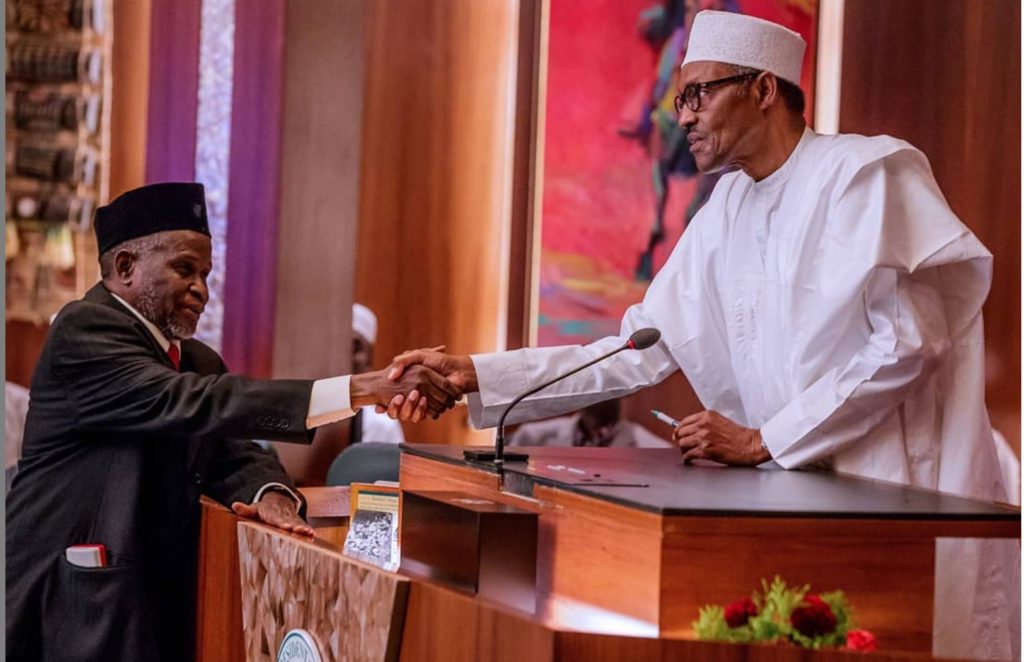The Federal High Court in Abuja has rejected an ex parte application for an order stopping President Muhammadu Buhari from swearing in Justice Tanko Muhammad as the substantive Chief Justice of Nigeria (CJN).
Muhammad has been acting as the CJN since January when President Muhammadu Buhari suspended the former CJN, Justice Walter Onnoghen.
With Onnoghen’s resignation and subsequent conviction by the Code of Conduct Tribunal, Muhammad is believed to be set to assume the office of the CJN in a substantive capacity.
The main suit filed by Malcom Omirhobo Foundation, a group being promoted and represented in court by a lawyer, Mr. Malcom Omirhobo, is challenging Muhammad’s fitness to hold the office of the CJN.
Justice Inyang Ekwo rejected the group’s ex parte application requesting an order stopping Buhari from swearing in the acting CJN in an acting capacity, in a ruling on Friday.
The enrolled order of the court was only sighted by The PUNCH on Monday.
Rather than grant the prayers contained in the ex parte application, the judge, in his ruling, directed the applicant to put all the seven defendants on notice.
Ex parte applications are characteristically conducted in the absence of the adverse parties.
But Justice Ekwo ruled that the prayers sought by the applicant in its ex parte application could not be granted in the defendants’ absence.
After hearing the plaintiff’s lawyer, Justice Ekwo ruled, “It is hereby ordered as follows:
“That none of the prayers made on this motion ex parte can be granted in the absence of the defendants.
“The plaintiff is hereby ordered to put the defendants on notice.
“The defendants are hereby granted seven days upon being served to appear and show cause why the application of the plaintiff ought not to be granted.
“Case adjourned till May 13, 2019 for the defendants to show cause.”
The 1st to the 7th defendants who are to show cause why Muhammad should not be sworn in as the CJN are, the National Judicial Council, the Federal Judicial Service Commission, the Acting CJN, Justice Tanko Muhammad; the Federal Government of Nigeria, President Buhari, the Attorney General of the Federation, and the National Assembly.
The plaintiff had in its substantive suit filed in April, alleged that Justice Muhammad made himself available as a tool that was used in the violation of the Constitution, especially with regards to the “illegal” removal of Justice Walter Onnoghen as the CJN.
The plaintiff in the suit marked FHC/ABJ/CS/420/2019, contended that with the role played by Muhammad in the alleged illegal removal of Onnoghen, Muhammad who is currently the most senior Justice of the Supreme Court, is unfit to replace the sacked CJN.
He contended that the Acting CJN conducted himself in a manner that reduced the confidence of the public in the integrity and impartiality of the Judiciary.
The plaintiff stated that the acting CJN
“is therefore not a proper and fit person to be recommended for appointment to head the judiciary.”
The plaintiff, among other things, urged the court to declare that the suspension and/or removal of a CJN from office, is a shared responsibility of the 1st defendant (NJC), 5th defendant (Buhari) and 7th Defendant (National Assembly).
He argued that President Buhari lacked the constitutional powers to unilaterally suspend and/or remove a sitting CJN from office, as was done in the case of Onnoghen.
He urged the court to interpret the provisions of sections 1(1 )(2), 231(4), 292(1)(a)(i)(b), 153(1)(i), 158(1) and paragraph 21 (a)(b) of Part 1 of the Third Schedule of the 1999 Constitution, in relation to the issue.
He urged the court to hold that
“it is unlawful and undemocratic for the 4th and 5th Defendants (Federal Government and President Buhari), to declare the office of the CJN vacant on January 25, 2019 and consequently appoint and swear in the 3rd Defendant as the acting CJN.”
He also urged the court order to restrain the National Assembly from confirming any appointment of Justice Muhammad as the substantive CJN.
He also sought,
“An order, compelling the 2nd defendant (FJSC), to select and the 1st defendant (NJC), to recommend the most qualified Justice of the Supreme Court of Nigeria that is fit and proper, to the 5th defendant, for appointment to office of the CJN, and for the confirmation of the 7th defendant with a two third majority vote”.
He prayed the court to stop President Buhari from appointing Justice Muhammad as the substantive CJN.
He maintained that unless restrained by the court, the executive arm of government would “continue to violate the extant provisions of the Constitution and sanctity of the judiciary”.
The applicant’s motion on notice seeking an order restraining Buhari from swearing in Muhammad as the substantive CJN pending the hearing and determination of the main matter comes up for hearing on May 13.
